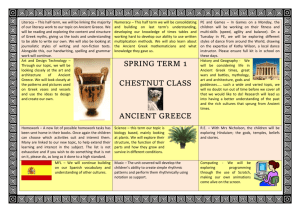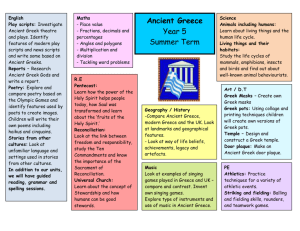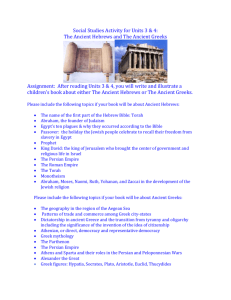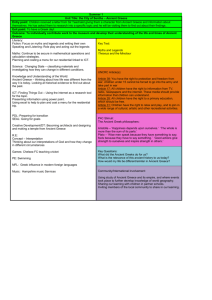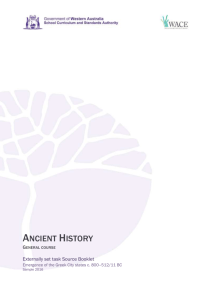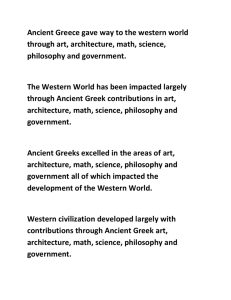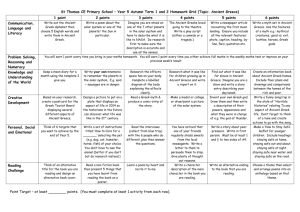File
advertisement
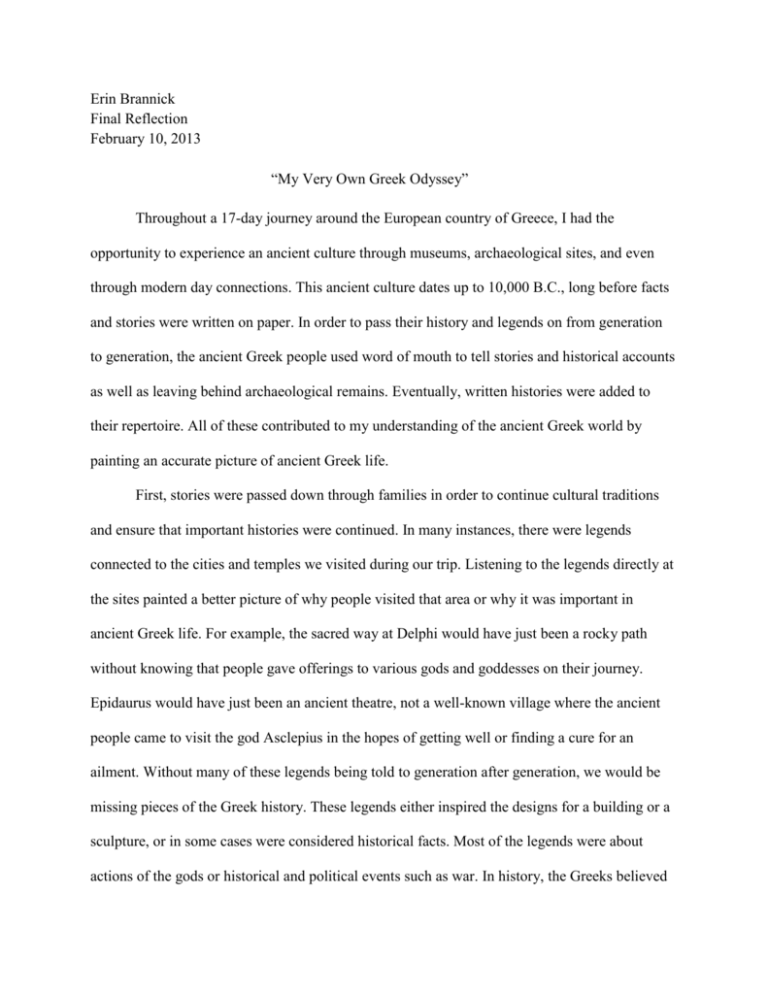
Erin Brannick Final Reflection February 10, 2013 “My Very Own Greek Odyssey” Throughout a 17-day journey around the European country of Greece, I had the opportunity to experience an ancient culture through museums, archaeological sites, and even through modern day connections. This ancient culture dates up to 10,000 B.C., long before facts and stories were written on paper. In order to pass their history and legends on from generation to generation, the ancient Greek people used word of mouth to tell stories and historical accounts as well as leaving behind archaeological remains. Eventually, written histories were added to their repertoire. All of these contributed to my understanding of the ancient Greek world by painting an accurate picture of ancient Greek life. First, stories were passed down through families in order to continue cultural traditions and ensure that important histories were continued. In many instances, there were legends connected to the cities and temples we visited during our trip. Listening to the legends directly at the sites painted a better picture of why people visited that area or why it was important in ancient Greek life. For example, the sacred way at Delphi would have just been a rocky path without knowing that people gave offerings to various gods and goddesses on their journey. Epidaurus would have just been an ancient theatre, not a well-known village where the ancient people came to visit the god Asclepius in the hopes of getting well or finding a cure for an ailment. Without many of these legends being told to generation after generation, we would be missing pieces of the Greek history. These legends either inspired the designs for a building or a sculpture, or in some cases were considered historical facts. Most of the legends were about actions of the gods or historical and political events such as war. In history, the Greeks believed the actions of the gods to be relevant to daily life and used legends to teach children the proper way to live and act. Next, the ancient Greek civilization left behind many archaeological remains, including: pots, sculptures, mosaics, frescos, homes, and even the remains of the people themselves. This led to clues about the way people lived during various time periods in Greek history. The size and shape of the pots as well as fragments inside indicated what the various pottery pieces were used for, such as storing grain, grapes, olives, ashes, etc. The sculptures and other decorations gave clues about the social status of the people who lived in that particular home or area. The remains of people that have been found gave archaeologists information about the size and health standards of people through different points in history. Without these remains, it would be more difficult to distinguish one region from another. In addition, designs on pottery and sculpture often indicated what was occurring in Greek culture during a particular time period – pictures of battles, funerals, or happier geometric and floral designs, for example. Eventually, actual written histories were added to the legends passed down by word of mouth and the archaeological evidence. These histories were important for the economic, political, religious, and educational aspects of Greek life. Once history was written down, it was easier to record laws, war tactics, battle strategies that worked or did not work, notes about trade, etc. Because these aspects of Greek history were now in a more preserved state, they could easily be taught in schools and spread throughout the country more accurately than by word of mouth. This helped on my journey through Greece because it added a more concrete history to the legends of any given area. It was interesting to learn the historical facts and how much they matched or did not match elements of legends. For example, some historical evidence calls Homer’s characters and dates into question. I believe that the combination of word of mouth legends, archaeological remains, and written histories paint as accurate a picture as possible of the ancient world. It is impossible for everything from tens of thousands of years ago to remain intact – natural disasters, war, disease, and other factors out of our control simply prevent it. I think the Greeks do an excellent job of using their resources to put together the puzzle that is their own history. As Roula often said, if archaeologists wanted to uncover everything there is to find, all Greeks (and probably surrounding countries too!) would have to leave. All of these sources provide clues to how they lived and interacted in ancient times, and the increasing archaeological technology of modern times is certainly helping this effort. My own odyssey through modern Greece combined all of these aspects, as well as adding in influences of the modern Greek world. This combination was one of the most interesting aspects of the trip. In one day alone, we were visiting a three-year-old museum with modern furniture and décor, and half a day later we are standing at an ancient Olympic stadium that is just a few blocks away, right in the middle of Athens. In another example, we are standing at the ancient Arcadian gate, and then a modern car just drives right through it as part of that person’s ordinary routine. I found myself walking in a more residential part of a smaller town, only to look to my right and see an archaeological site they found while starting to build a house. The ancient culture is literally still present in the Greek’s modern life. Some of the city buildings mimic ancient columns and architecture, and pottery and jewelry are still considered part of decorations and daily life. The modern world helped my understanding of the ancient Greek world because of the respect that modern Greek people have for their own culture and history. It is clear to see that some of the cultural customs, the Greek language, food, and more, stem directly from their own past. Many of the modern people we interacted with had their own opinions or versions of stories to share based on their individual family history or experiences. My odyssey through ancient (and modern) Greece gave a whole new meaning to ‘experiential learning’. I was presented stories passed from generation to generation, archaeological artifacts, published historical facts, and modern culture in order to form my own conclusions about ancient Greek life. The ancient Greek people appear to have been intelligent, technologically-advanced, spiritual, and exceptionally creative people. Despite their current economic situation, the modern Greek people seem to be some of the happiest, most free-spirited people I have ever met, in addition to being incredibly familiar with their own past. It was not hard to find a native Greek who was quick to give credit to history for the reason that Greece is on the map today.

